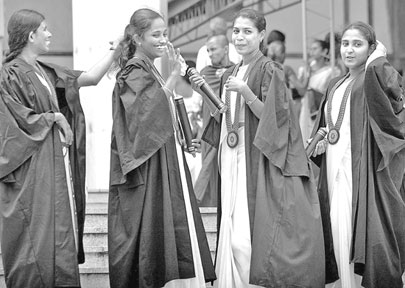The case for private universities
By Pramod DE SILVA
There is a raging debate in the media and in civil society on the
proposed establishment of private universities, perhaps as early as next
year. Sri Lanka prides itself on its free education system which enables
students to receive education free, from Grade One to beyond the
university degree level.
 |
|
Higher Education
Minister
S.B. Dissanayake |
Whatever the detractors say, Sri Lanka already does have a vibrant
private education sector. In addition to the established private
schools, there are many international schools, tuition classes and
higher educational institutions affiliated to foreign institutes and
universities. There has been no protest regarding the operation of these
institutions from any quarter.
Complementary role
Private universities, it seems, will take it just one step forward.
Some of the world’s best universities are privately run ones and there
is no reason why it cannot happen here as well.
There is fundamentally no reason why university students or others
should fear the establishment of private universities. There is no doubt
that they will co-exist with State universities and play a complementary
role in the country’s education system.
What exactly is a private university ? The term “private” simply
means that the university’s funding comes from tuition, investments and
private donors, not from taxpayers. However, it does not mean that they
are completely free from Government controls and regulations. Far from
it, they are likely to be scrutinised for their conduct and performance.
It is ironic that university student leaders or firebrand politicians
do not either acknowledge or conveniently ignore, the fact that
thousands of Sri Lankan students go to foreign universities every year.
No one has opposed that and with good reason too - it is a democratic
right. But many fail to see another important factor in this scenario.
It is called foreign exchange.
Foreign universities, especially those in the affluent West, often
charge an enormous amount for tuition. A parent can typically look at a
figure of Rs.5 million at least over four years. The high boarding fees
and living expenses are extra. It basically means that millions of
rupees in hard-earned foreign exchange go to other countries to fund our
citizen’s education.
 If we had one or two world-class private universities here, at least
50 percent of those students would opt to remain here and attend them.
The resulting foreign exchange savings will be considerable. If we had one or two world-class private universities here, at least
50 percent of those students would opt to remain here and attend them.
The resulting foreign exchange savings will be considerable.
We would even earn foreign exchange through a private university.
Such a university could attract foreign students, especially from the
SAARC region and the Middle East, with a competitive fee structure. Low
living and lodging costs are another attraction for these students. It
will also be possible to attract students worldwide with online courses.
A change in attitudes is essential before a private university is
established. It would be wrong to assume that only the best students go
to our universities and the rest are not worthy of university admission.
Thanks to a theory-based, rote-based education and examination
system, there are many instances when really bright students end up on
the wrong side of the fence.
They miss university by a whisker and are sometimes unable to find
other educational opportunities or employment. A private university
could fill this void, albeit at a cost. In other words, graduates of a
private university would not necessarily be the intellectual misfits
that university unions think they would be.
It will give an opportunity for students who cannot enter
conventional universities to pursue their educational goals. Granted,
this will cost money but it will still be much lower than the fees
charged by universities abroad.
 Safeguards can and should be established, as in the case of medical
graduates from foreign universities who have to sit for an examination
locally to qualify to work as doctors in Government hospitals. There
should be a rational and viable basis for admission as well, so that,
for example, someone who has failed the A/Ls cannot enter a private
university. Safeguards can and should be established, as in the case of medical
graduates from foreign universities who have to sit for an examination
locally to qualify to work as doctors in Government hospitals. There
should be a rational and viable basis for admission as well, so that,
for example, someone who has failed the A/Ls cannot enter a private
university.
Sri Lanka is really lagging behind, even in our region when it comes
to private universities. A quick search on the Internet reveals that
many countries have private universities or are in the process of
allowing them. In Asia, private universities operate in Bangladesh,
India, China, Indonesia, Japan, Pakistan, Philippines and Vietnam, among
others. Some of the best universities in the US and Europe are privately
owned.
Proper management
The Bangladesh Parliament recently passed a bill providing detailed
rules for establishing private universities, their proper management and
expanding quality education in the country. This will replace the first
Act passed in 1992. Some 215,000 students are studying at 54 private
universities across Bangladesh.
This new Bill should be studied in depth by our higher education
authorities, to look for any relevant lessons. The Bangladeshi Education
Minister said the new law appeared necessary to ensure quality education
in the private universities to create skilled manpower, which is a
requirement here as well.
Another proposal in the new Bangladeshi Bill should be studied by our
authorities led by Higher Education Minister S.B. Dissanayake. This is
the mandatory requirement of a ‘Minimum Reserve Fund’ of Taka 50 million
in the name of a proposed private university. These funds could be used
to develop higher education, especially State universities. Moreover,
private universities are required to have all facilities including an
adequate number of classrooms, library, laboratory, auditorium, seminar
room, office room, student’s common room and other rooms and
infrastructure.
Every private university must have a Board of Trustees, Syndicate,
Academic Council, Faculty, Institute, Curriculum Committee, Finance
Committee, Teacher Appointment Committee and Discipline Committee.
Again, these laws will be relevant to our private university scenario.
The Bangladeshi Bill also seeks controls on advertising by private
universities, so that no misleading information reaches the students.
Here too, we have seen education advertisements which virtually offer
‘miracles’ thus misleading parents and students. Private universities
will have to be more transparent about what they are offering to
students.
Worldwide, an expansion in private universities has been projected,
as students face a shortage of places. In Sri Lanka too, thousands of
deserving students do not get the opportunity to enter State
universities as they fall short of a few marks. Private universities
will offer them a new avenue for higher education.
Considering the proposals already in the air regarding private
universities, it is commendable that only reputed institutions
affiliated to well-known foreign universities would be allowed. This
will reassure students and parents that they are getting a better deal
for the funds they are investing on education.
 It is also heartening to note that private universities will be
required to grant a considerable number of scholarships to local
students, probably those who had just missed the State university bus.
This will also dilute the opposition stand against private universities
from those who say that they will ‘lock out’ talented students. In any
case, the private universities should have a competitive fee structure
accessible to middle class students. It is also heartening to note that private universities will be
required to grant a considerable number of scholarships to local
students, probably those who had just missed the State university bus.
This will also dilute the opposition stand against private universities
from those who say that they will ‘lock out’ talented students. In any
case, the private universities should have a competitive fee structure
accessible to middle class students.
They could perhaps have a slightly higher fee structure for foreign
students.
Private universities should also be required to offer courses that
are different to those offered by State universities where possible.
Granted, there are a few main fields that all universities worth their
salt like to have in their prospectus, but they should find room for
new, technology-oriented courses currently not offered by the
Government-run universities. That will also minimise the duplication of
courses at both types of institutions while addressing the concerns of
the (private sector) employers. With all universities slated to offer
courses in the English language, employers will receive another boon.
The debate on private universities will - and should - continue, so
that the authorities can assess the views of all stakeholders and arrive
at a suitable mechanism for their establishment and regulation. If
properly instituted and regulated, it will be another feather in the cap
in Sri Lanka’s highly successful education system, believed to be on par
with the best in the world. |

